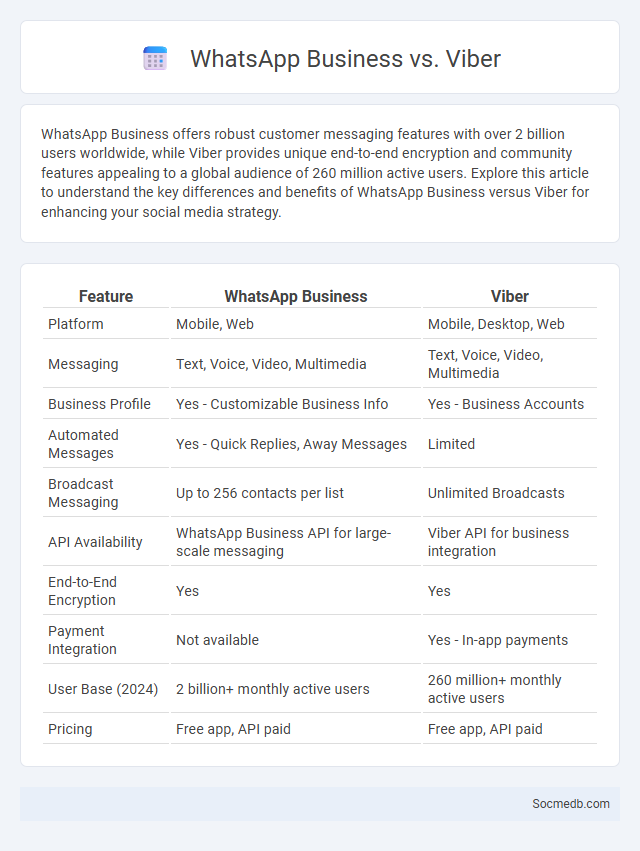
Photo illustration: WhatsApp Business vs Viber
WhatsApp Business offers robust customer messaging features with over 2 billion users worldwide, while Viber provides unique end-to-end encryption and community features appealing to a global audience of 260 million active users. Explore this article to understand the key differences and benefits of WhatsApp Business versus Viber for enhancing your social media strategy.
Table of Comparison
| Feature | WhatsApp Business | Viber |
|---|---|---|
| Platform | Mobile, Web | Mobile, Desktop, Web |
| Messaging | Text, Voice, Video, Multimedia | Text, Voice, Video, Multimedia |
| Business Profile | Yes - Customizable Business Info | Yes - Business Accounts |
| Automated Messages | Yes - Quick Replies, Away Messages | Limited |
| Broadcast Messaging | Up to 256 contacts per list | Unlimited Broadcasts |
| API Availability | WhatsApp Business API for large-scale messaging | Viber API for business integration |
| End-to-End Encryption | Yes | Yes |
| Payment Integration | Not available | Yes - In-app payments |
| User Base (2024) | 2 billion+ monthly active users | 260 million+ monthly active users |
| Pricing | Free app, API paid | Free app, API paid |
Introduction to Messaging Apps for Business
Messaging apps for business revolutionize customer communication by enabling instant, direct interaction through platforms like WhatsApp, Facebook Messenger, and Slack. These apps streamline customer support, sales, and marketing efforts by offering real-time responses, personalized messaging, and easy multimedia sharing. Your business can enhance engagement and build stronger relationships by integrating messaging apps into social media strategies.
Overview: WhatsApp Business Features
WhatsApp Business offers a range of features designed to enhance communication for small and medium-sized enterprises, including automated responses, quick replies, and labels for efficient organization of chats. The platform supports product catalogs, enabling businesses to showcase their offerings directly within the app, while providing insights through messaging statistics to track customer engagement. Your use of WhatsApp Business can streamline customer interactions and improve service responsiveness, making it a vital tool in digital marketing strategies.
Key Features of Viber for Business
Viber for Business offers multilingual chatbot integration, enabling seamless customer support across global markets. Its rich messaging capabilities include interactive buttons, image carousels, and QR code promotions, enhancing user engagement. Advanced analytics provide detailed insights into campaign performance, optimizing marketing strategies for better conversion rates.
Understanding Business Accounts: Definition and Benefits
Business accounts on social media platforms offer specialized tools designed to help you manage your brand's online presence effectively. These accounts provide access to analytics, advertising options, and customer engagement features that enhance visibility and foster growth. Leveraging a business account allows you to track performance metrics, target specific audiences, and build stronger connections with your customers.
User Interface & Experience Comparison
Social media platforms vary significantly in user interface (UI) and user experience (UX) design, impacting how you navigate and engage with content. Instagram prioritizes visual content with a clean, minimalistic layout that enhances image and video sharing, while Twitter focuses on real-time updates with a timeline that emphasizes text and trending topics. Facebook integrates a multifunctional UI that combines social networking, marketplace, and groups, where your ease of finding features can influence your overall engagement and satisfaction.
Communication Tools and Automation
Social media platforms integrate advanced communication tools such as instant messaging, video calls, and interactive posts to enhance user engagement and real-time interaction. Automation features like chatbots, scheduled postings, and AI-driven analytics streamline content management and improve response efficiency. These technologies collectively optimize brand presence and customer relationship management on digital channels.
Security and Privacy Considerations
Social media platforms collect vast amounts of personal data, making security measures like end-to-end encryption and multi-factor authentication essential for protecting user information. Users should regularly update privacy settings to control data visibility and prevent unauthorized access. Implementing stringent data protection policies and GDPR compliance helps mitigate risks such as identity theft and data breaches.
Integration and API Capabilities
Social media platforms offer robust integration and API capabilities that enable seamless connectivity with third-party applications, enhancing your digital marketing and analytics efforts. These APIs facilitate data extraction, content scheduling, and automated responses, streamlining workflow and improving user engagement metrics. Leveraging social media APIs empowers businesses to customize features and synchronize multiple platforms efficiently for optimized brand presence.
Pricing and Accessibility
Social media platforms offer a range of pricing models, including free access with ads, subscription-based plans, and paid features targeting business users. Accessibility is enhanced through mobile apps, web interfaces, and support for multiple languages and disabilities, ensuring a broad user base worldwide. Affordable pricing combined with widespread device compatibility drives social media adoption across diverse demographics.
Choosing the Right Platform for Your Business
Selecting the right social media platform for your business hinges on understanding your target audience's demographics, behaviors, and preferences on each channel. Platforms like Instagram excel for visually-driven brands, whereas LinkedIn is ideal for B2B companies seeking professional networking. Aligning your content strategy with your audience's favorite platforms maximizes engagement and ROI.
 socmedb.com
socmedb.com